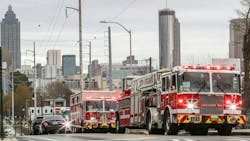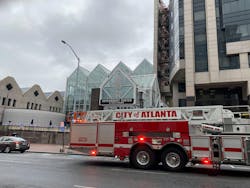Report: One-Third of Atlanta's Fire Apparatus Beyond Life Cycle
A recently released report by the city of Atlanta’s auditor found that one-third of the city’s fire vehicles were beyond their life cycles as of January — some with “significant mechanical issues.”
The fire fleet has only three reserve engines and no ladder trucks to cover the city, and the number of backup vehicles falls far below national standards, according to the 46-page report.
The audit points to a lack of replacement strategy by the city as a reason Atlanta’s firefighters have been relying on outdated trucks.
Elected officials began sounding the alarm last fall, when a series of severe fires across the city highlighted the department’s dire equipment shortage. Atlanta City Council members say the issue is far from being resolved.
At the time, anywhere from two to 20 engines and ladder trucks were out of commission due to mechanical issues, and stations were sharing trucks to accommodate needs across the city.
The situation prompted a series of investments by City Council into new fire trucks and equipment. But officials have been left playing catch-up after years of lapsed replacement fleet purchases.
According to the audit, in 2022 and 2023, an average of 12 trucks were out-of-service and in the shop for repairs each day — or about 21% of the entire fleet. The number of sidelined trucks reached 40% in January 2023.
More than 20% of Atlanta’s fire trucks have been in use for more than 20 years — the oldest vehicle in the fleet is 9 years beyond when it should have been retired.
In response to the audit results, the Department of Public Works — which oversees fleet services — said that it is working toward “implementing a comprehensive plan to significantly enhance the maintenance of the (AFRD) fleet.”
“Key actions include increasing the frequency of regular meetings with AFRD to better understand and address the department’s needs and upgrading the fleet management information system to align more effectively with operational goals,” a spokesperson for the department said in a statement.
Atlanta City Council member Dustin Hillis, former head of the public safety committee, has lead the effort to earmark millions for the fire department to purchase additional trucks and equipment. But allocation of funds only goes so far, he said, when orders aren’t being made.
“I want to see a plan,” he said. “What’s the plan this fiscal year? What’s the plan next fiscal year? For the next five years? I don’t think I’ve gotten that because I don’t think it actually exists.”
The last new fire truck delivered to the city was in 2019 under the previous administration, said Hillis, who said he suspects the number of sidelined trucks is higher than the audit reported.
From 2017 through 2024, the city ordered 30 of 58 fire trucks approved for purchase, the audit found, due to insufficient funding. No new vehicles were purchased at all in 2021.
In December 2023, a consultant working with the Department of Public Works identified an “immediate need” to replace 15 fire vehicles at the cost of more than $18.5 million.
But the wait time for a new truck — which fire officials have said is due to backlog and supply chain issues — can be anywhere from two to four years.
Fire sergeants interviewed by the auditor’s office detailed persistent problems with leaking engine fluids, air brakes and water tanks. On some trucks, seat belts are worn to shreds and photos of the engine parts inventory shows a stock room in disarray.
Turnover of technicians in the repair shop has only added to the problems.
A massive fire at Bell Collier Village on Howell Mill Road NW on July 27 renewed concerns from City Council members about the number malfunctioning fire trucks.
According to an “apparatus out of service report” from that week obtained by The Atlanta Journal-Constitution, four fire trucks and four engines were sidelined that day.
In a letter dated three days after the Howell Mill Road fire, Council member Andrea Boone, head of the public safety committee, requested a fleet status update from Fire Chief Rod Smith, Interim Commissioner of Public Works Kentorri Garmon and Chief Operating Officer LaChandra Burks.
“We would also like the fleet replacement plan for this new fiscal year and the plan covering the next five years,” she wrote.
Atlanta’s elected officials are exploring new funding pathways to bolster the insufficient fleet.
Hillis said that either a one-time dip into the city’s reserves or a ticket surcharge for big events like concerts and sporting events could be on the table. But that would require legislation through the Georgia General Assembly.
“You can buy all the new apparatus you want, but if you don’t actually maintain them in the way they’re supposed to be then what’s the point?” Hillis said.
©2024 The Atlanta Journal-Constitution. Visit at ajc.com. Distributed by Tribune Content Agency, LLC.


